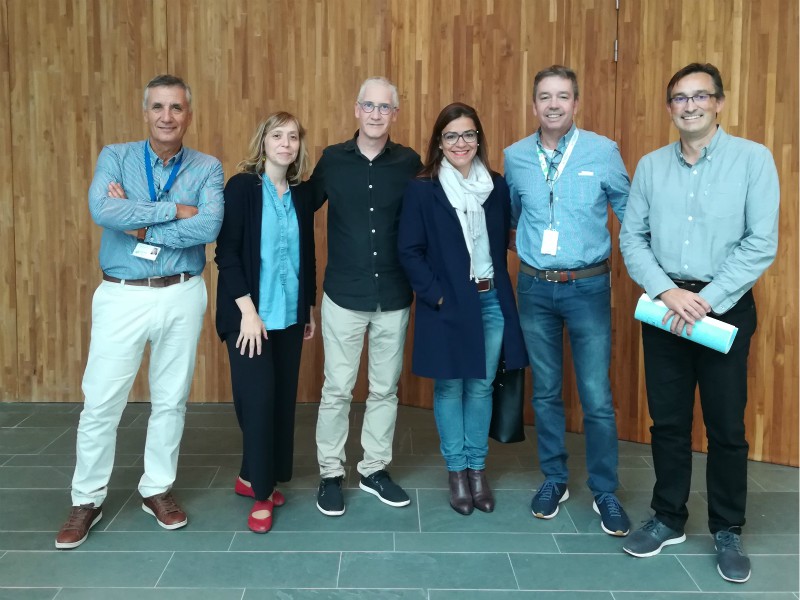The first half of the Can Ruti Biomedical Research Seminar Series completed in style

This year the Germans Trias i Pujol Research Institute (IGTP), the IrsiCaixa AIDS Research Institute and the Josep Carreras Leukaemia Research Institute (IJC) have got together to organize the first Can Ruti Research Seminar Series. The scientific committee invited eleven speakers and arranged sponsorship from AstraZeneca and Celgene. After completion of the first half of the series the organizers are very pleased with the results.
The initiative came from the desire to organize top quality scientific seminars to enable researchers to meet leaders of different fields and learn about their scientific trajectory and current advances, Marcus Buschbeck, organizer for the IJC told us. This is not only for group leaders but a great chance for young student researchers to join the mentoring lunches before the talks, something that has proved very popular.
Talks this term have included Dr Benoit Gauthier from the Centro Andaluz de Biología Molecular & Medicina Regenerativa (CABIMER) who gave a masterclass on the immune system and his innovative work on diabetes. Dr Artur Scherf, CNRS Research Director and Professor at the Institut Pasteur, Paris followed with a description of his research on using epigenetic factors to fight the malaria parasite in a talk of interest to researchers from a wide range of fields on the campus. In November two talks on aspects of leukemia research, proposed by researchers from the IJC, took place: Dr Florian Heidel, of the Friedrich-Schiller-Universität Jena talked about blood biology and the consequences of blood stem cells accumulating mutations over time and Dr Thorsten Haferlach described the major German Biobank for blood samples at MLL, which collects 78,000 samples per year to study malignant blood diseases. Dr Haferlach explained how mechanisation and data processing is concentrating research on bioinformatics pipelines and data analysis, the problems of data storage and how diagnostic tools are evolving rapidly at the start of this century. The series for 2018 was concluded with another masterclass from Dr Pedro Vale of Edinburgh University who demonstrated how a drosophila model has allowed his group to model epidemics in populations in order to make predictions based on different factors, bringing a tangential view in infectious disease research and providing more insights into why some individuals are more infectious or get sicker than others.
As a start of a new scientific activity, we are very pleased indeed, said Sónia Forcales, organizer for the IGTP. The talks have been at a high level, but extremely didactic and accessible to researchers from all fields, we have had the opportunity to hear 5 really excellent communicators, she added. The organizers hope more students attend from January, as the seminars count as credits on many courses. Next the whole series should be accredited as continuous training sessions for healthcare professionals and researchers alike.
After an open call the new committee for 2018-2019 is already hard at work: Christian Brander for the IrsiCaixa, Ruth Risueño for the IJC, Marcel·la Franquesa for the IGTP and Anna Martínez Cardus for the IGTP-ICO (Catalan Institute of Oncology) make up the team. They are currently finalizing the programme and contacting sponsors for the next series starting in September.
As often happens, we have learned from the first round, says Julià Blanco organizer for IrsiCaixa, and we are very confident that the new organizers will improve greatly on our process. The second part of this first series is exciting with some very varied names from different fields. We are very proud to have got this up and running, it definitely increases the international exposure of basic research on the campus and we are all looking forward to being able to meet and hear a new scientific superstar once a month.
See the list of upcoming speakers here
Meeting Speakers
For PIs wishing to have a meeting with the speaker or junior researchers wishing to take part in the lunch and mentoring session with one of the speakers (places limited to 8 on a first-come-first-served basis) please contact the host for that session.
Suggestions for speakers
The current committee is drawing up the new list. The call for suggestions closed in December, but for future series suggestions should include one man and one woman and a 2-line text explaining why they are a good fit and be sent to comunicacio(ELIMINAR)@igtp.cat
